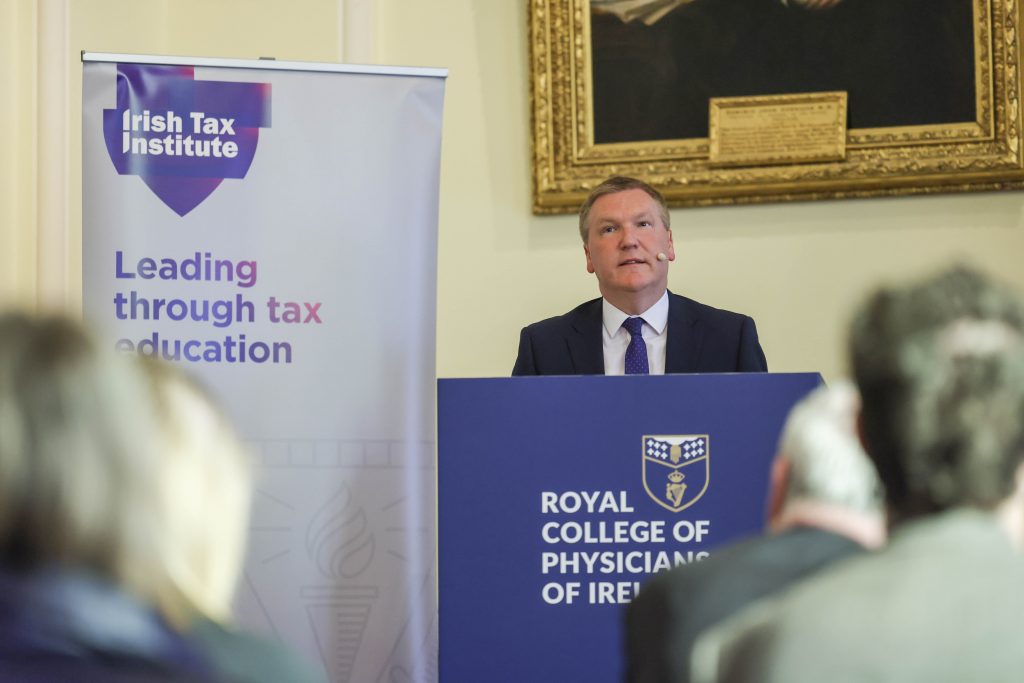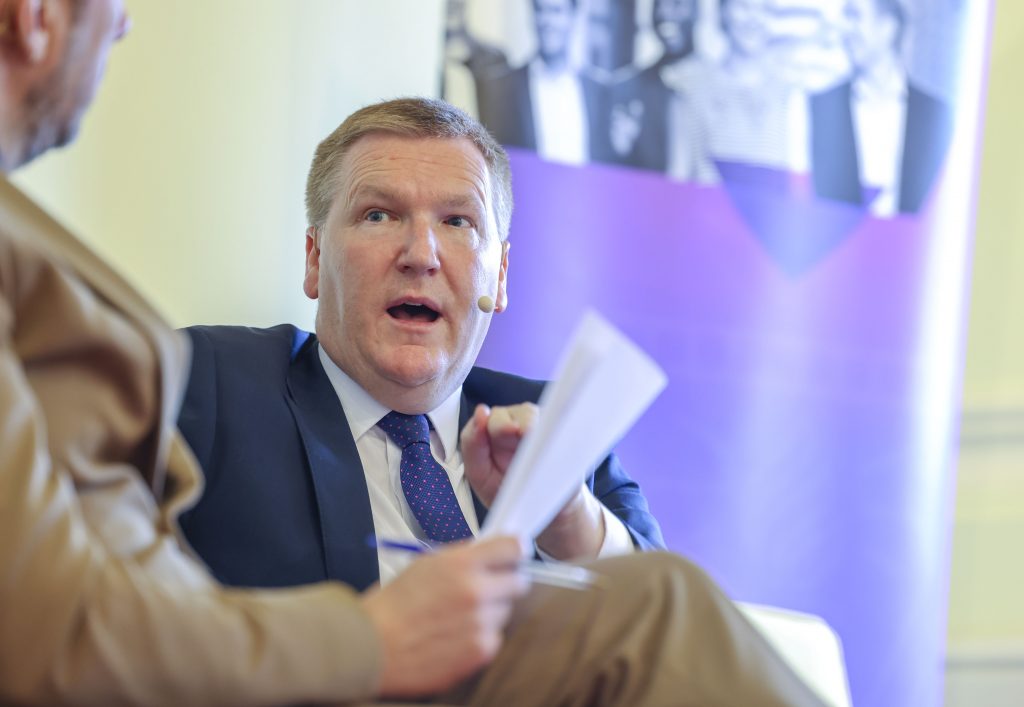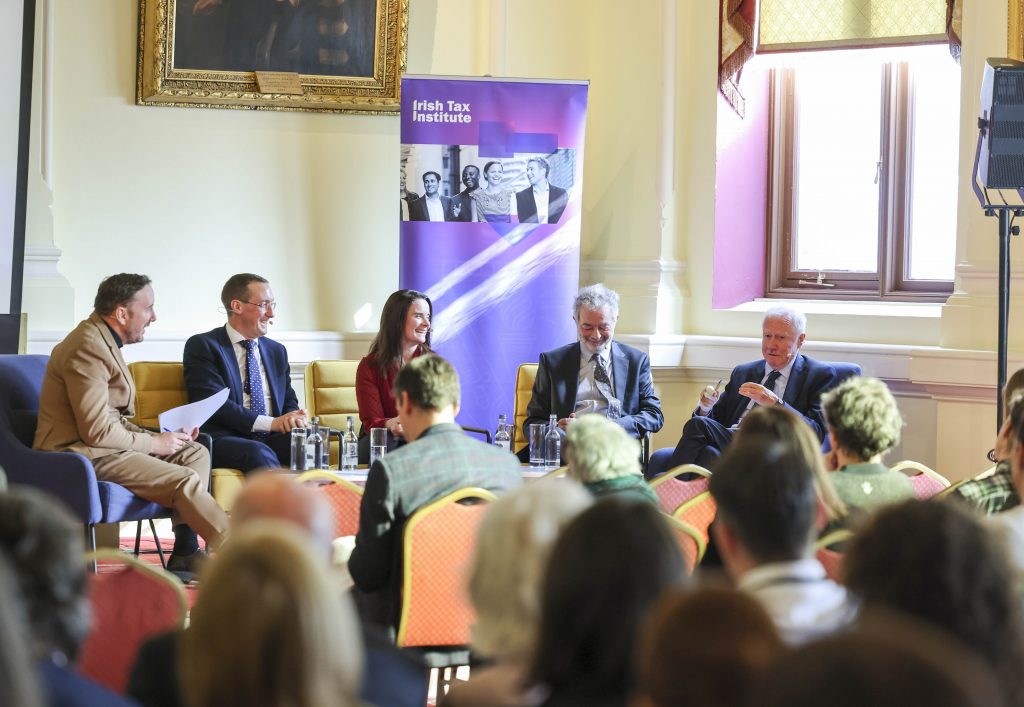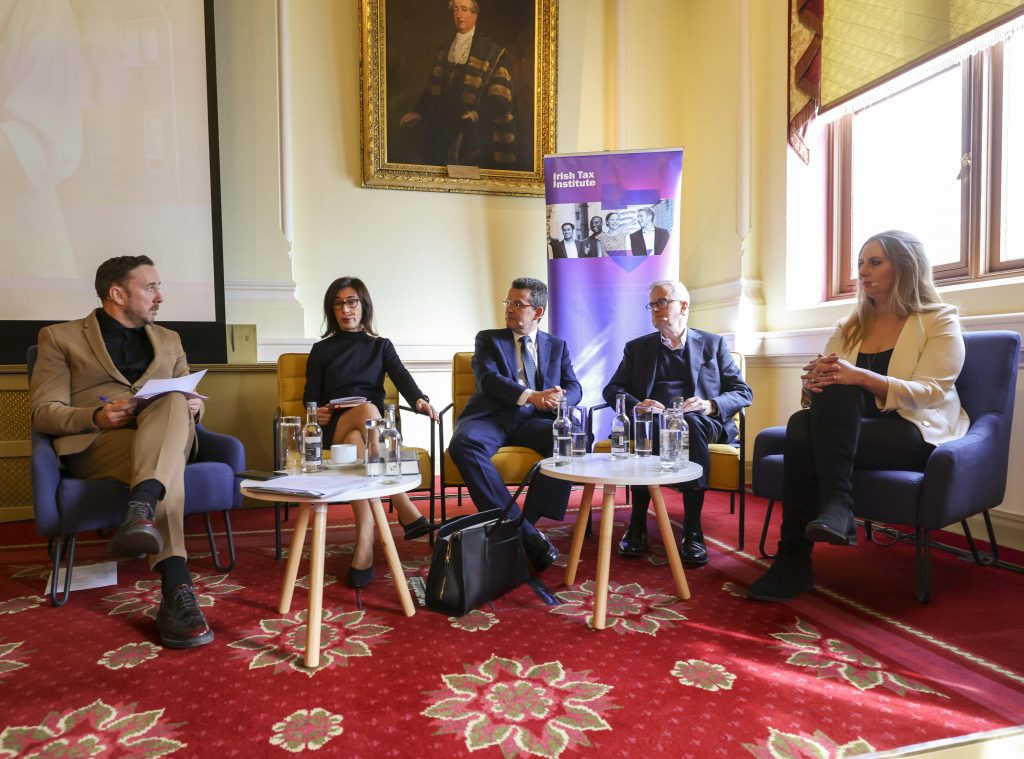On Wednesday (22 March) morning, the Institute hosted a complimentary seminar for members on the Commission on Taxation and Welfare Report – the Practical Implications. Over 100 members joined us in the Royal College of Physicians for the event. You can see photos from the event here.
The seminar began with a keynote address from the Minister for Finance, Michael McGrath TD. The Minister’s address was followed by a Q&A and two panel discussions moderated by Shane Coleman, presenter on Newstalk’s Breakfast programme, to assess the Report of the Commission on Taxation and Welfare – Foundations for the Future (the Report) and debate the practicalities of implementing its recommendations.
In his keynote address the Minister noted Ireland has one of the most progressive taxation and welfare systems among advanced economies, stating, “Those who earn or have the most, pay the most.” Commenting on wide ranging and challenging Terms of Reference with which the Commission on Taxation and Welfare (CoTW) was tasked, the Minister said, “At its heart, the report has made a range of recommendations aimed at improving the sustainability of the taxation and welfare systems in order to support public services that people rely on over the medium and long term. While the report presents a balanced package of reform proposals aimed at addressing some of the medium to long term challenges facing the State, many of the recommendations are clearly difficult to achieve and, as is acknowledged in the report, come at a demanding time economically.”

The Minister noted that while the Irish economy has been transformed over the past three decades, this success cannot be taken for granted and therefore it is important to promote investment and growth in indigenous enterprise, while also attracting foreign direct investment.
The Minister stated that the work of the CoTW has brought into focus the substantial fiscal risks that are facing the State over the medium term. The Minister said “Ireland’s demographic profile is aging, we have a high level of public debt, and we need to fund the climate transition.”
Speaking about the ongoing public consultation on the Personal Tax System the Minster stated, “The review will take account of the recent report from the Commission on Taxation and Welfare and consider a range of personal taxation issues.”
The Minister also confirmed his intention to commence a review on the taxation of investment products and on Real Estate Investment Trusts (REIT), Irish Real Estate Funds (IREF) and section 110 companies as recommended in the Report and the Minister noted stakeholder consultations will be a feature of the reviews. In relation to tax expenditures the Minister confirmed, “My department is currently working on updating the Guidelines for Tax Expenditure Evaluation, with particular focus on the recommendations set out in chapter 16 of the Commission’s report.”
On the issue of Capital Taxes, the Minister observed that many of the recommendations in the Report would require significant changes to existing approaches and require careful consideration. He said the impacts on business and investment of the Commission’s recommendations must be fully taken into consideration before any changes are made. The Minister stated, “While my department will consider the Commission’s recommendations in the context of the continuous monitoring of these reliefs, I do not intend to bring forward substantial changes as proposed by the Commission.” During his Q&A with Shane Coleman the Minister noted that many of the recommendations on Capital Taxes in the Report would be difficult to implement and he is not convinced that they are the right thing to do.
The Minister stated there are a significant number of important tax measures to encourage investment in our economy and in particular our indigenous SMEs, such as, the EIIS, KEEP, the R&D Tax Credit and CGT Entrepreneurial Relief. The Minister said, “I want to again assure you that I am committed to taking a fresh look at all the enterprise tax measures on the table. As Minister for Finance, I want to ensure that we are unlocking their full potential by encouraging more investment and growth and I would very much welcome all your feedback on these matters that are critical to our economic competitiveness.”
During his Q&A with Shane Coleman the Minister confirmed that the Report will be considered carefully in the context of Budget 2024 and that he will be implementing some of the recommendations in the upcoming Budget.

The first panel of expert speakers, at the Commission on Taxation and Welfare Report – the Practical Implications seminar, included Colm Browne, President, Irish Tax Institute, Muireann Lynch, Senior Research Officer, ESRI, Austin Hughes, Economist and Donal de Buitléir, former Secretary to the Commission on Taxation 1980-85 and a prominent figure in public policy and administration. Themes from the first panel included the need to broaden the tax base while considering the economic impacts of any changes. The Commission’s recommendations regarding removing age as a factor for determining the charge to personal income taxes was considered and the panel discussed the need to move away from reliance on labour taxes and instead to make changes to VAT and property taxes. The panel contemplated the options for filling the gap from decreasing excise taxes on fossil fuels and debated the possibility of introducing congestion charges, noting that these would be difficult to implement but would impact behaviours.

L – R: Shane Coleman, Newstalk, Colm Browne, Institute President, Muireann Lynch, ESRI, Austin Hughes, and Donal de Buitléir. Fennell Photography 2023.
The second panel of expert speakers included Marie Bradley, Managing Director, Bradley Tax Consulting, John McGrane, Executive Director, Family Business Network Ireland, Raymond Donegan, Managing Director and Head of Family Business, IBI Corporate Finance and Rosanne Longmore, CEO, med-tech start-up Coroflo. The second panel considered the implications of the Commission’s recommendations for indigenous businesses. The panel agreed that the existing tax measures to encourage investment in our economy need to be reviewed to make it easier for small domestic businesses to avail of these measures. Barriers to early-stage funding for start-ups was another key theme from the panel discussion. The panel discussed the merits of a reduction of capital gains tax rate for “active” business assets and how this could foster investment and encourage innovation and productivity in our domestic sector.

L – R: Shane Coleman, Newstalk, Marie Bradley, Bradley Tax Consulting and member of the CoTW, Raymond Donegan, IBI Corporate Finance, John McGrane, FBN Ireland, and Rosanne Longmore, Coroflo. Fennell Photography 2023.

 Share this
Share this  Share this
Share this